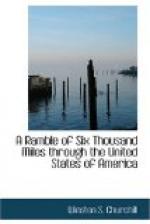From Albany I proceeded along the canal, by West Troy and Junction, and near the latter place we came to Cohoe’s Falls, on the Mohawk. The river here is about 250 yards wide, which rushing over a jagged and uneven bed of rocks, produces a very picturesque effect. The canal runs nearly parallel with this river from Junction to Utica, crossing it twice, at an interval of seven miles, over aqueducts nearly fifty rods in length, constructed of solid beams of timber. The country is very beautiful, and for the most part well cultivated. The soil possesses every variety of good and bad. The farms along the canal are valuable, land being generally worth from fifty to a hundred dollars per acre.
Above Schenectady, a very ancient town, the bed of the canal gave way, which of course obliged us to come to a dead halt. I hired, for myself and two others, a family waggon (dignified here with the appellation of carriage) to take us beyond the break, in expectation of being able to get a boat thence onwards, but unfortunately all the upward-bound boats had proceeded. We were, therefore, obliged to wait until next morning. My fellow travellers having light luggage, got themselves and it into a hut at the other side of the lock; but I, having heavy baggage, which it was impossible to carry across, was compelled to remain on the banks, between the canal and the Mohawk, all night. On the river there were several canoes, with fishermen spearing by torch-light; while on the banks the boatmen and boys, Mulattos and whites, were occupied in gambling. They had tables, candles, dice, and cards. With these, and with a quantum sufficit of spirits, they contrived to while away the time until day-break; of course interlarding their conversation with a reasonable quantity of oaths and imprecations. The breach being repaired early in the morning, the boats came up, and we proceeded to Utica.
Seven miles above Utica is seated Rome, a small and dirty town, bearing no possible resemblance to the “Eternal City,” even in its more modern condition, as the residence of the “Triple Prince;” but, on the contrary, having, if one could judge from the habitations, every appearance of squalid poverty. Fifteen miles further on, we passed the Little Falls. It was night when we came to them, but it being moonlight, we had an opportunity of seeing them to advantage. The crags are here stupendous—irregular and massive piles of rocks, from which spring the lofty pine and cedar, are heaped in frightful disorder on each other, and give the scene a terrifically grand appearance.
From Rome to Syracuse, a distance of forty-six miles, the canal is cut through a swampy forest, a great portion of which is composed of dead trees. One of the most dismal scenes imaginable is a forest of charred trees, which is occasionally to be met with in this country, especially in the route by which I was travelling. It is caused by the woods being fired, by accident or otherwise. The aspect of




